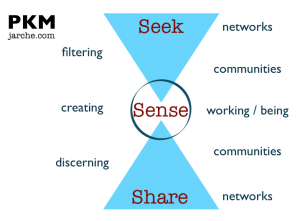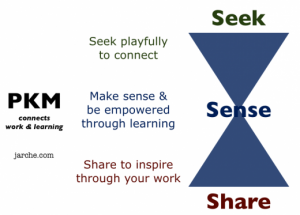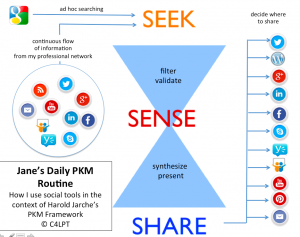
Over the past few weeks I’ve had the opportunity to speak with groups of passionate educators at FETC and Pete & C, and based on feedback following my sessions, I’m convinced even more so that both administrators and teachers seek truly meaningful professional development opportunities for themselves and their staff.
We spoke of Edcamps and unconferences and Fed Ex Days and the like, but one of the ideas that has most inspired me in recent months is the concept of Personal Knowledge Management shared by Harold Jarche. After sharing PKM during my sessions I noticed that his ideas struck a cord with many folks.
Yes, as administrators and designers of professional development we have to keep the big picture in mind and plan to use our limited numbers of PD days in ways that address school and district goals, while simultaneously trying to skilfully differentiate to meet the needs of our individual teacher learners. Easier said than done, for sure.
But let’s face the facts. Admin/districts/schools/divisions can’t provide professional learning opportunities that exactly meet the needs of all of their teachers, all of whom are at various points in their careers, all of whom have different strengths, needs, wants, passions, interests.
The teacher, the admin, the coach – the individual – has to assume responsibility for his own learning. The individual path an educator takes to grow professionally must be built by the learner, for himself, in order to be effective. No two paths will look the same. And that’s a good thing.
Jarche shares this definition of Personal Knowledge Management:
“PKM: A set of processes, individually constructed, to help each of us make sense of our world and work more effectively.”
Personal knowledge management means taking control of your professional development, and staying connected in the digital workplace.
More than just a framework to help guide your personal learning efforts, PKM is a method through which the learner makes sense of the flood of information bombarding him on a daily basis and determines how that information should be used (or not used). Because for those of us who are “connected,” and choose willingly to engage in social learning networks, we know there is no shortage of information and resources coming our way. So how do we make sense of it all? How do we use it effectively?
Note this important phrase in the PKM definition: individually constructed. What works for one will not work for all. This is personal. This is about the individual. This is about empowerment and ownership. This supports learning done by you. And yet, we will see, it is also social in nature.
Jarche shares these essential elements of PKM. How can you embrace the Seek-Sense-Share model to support your learning?

Seek – We find information, we stay up to date. Information comes to us. We search for information ourselves. We rely on our networks to bring us curated resources.
Sense– After we seek, we must make sense of the information we find. We reflect on the things we read and experience. We put ideas into practice.
Share – We give back. We exchange resources with others. We collaborate with one another.
Check out Jarche’s PKM in 34 Pieces for additional explanations and support to understand the processes included in this model.
Many new to connected learning consider themselves “lurkers” to social spaces such as Twitter. They read, they consume, but at least initially, they do not contribute. I have my own opinions about whether lurking should be considered a legitimate form of peripheral participation, but I always encourage educators new to the connected realm to give back. You may lurk, initially, and get your feet wet, and learn about the community or network itself, but don’t remain a lurker. If all you do is take, take, take and don’t give back to the community, in my opinion, the community suffers. Here’s another post that thinks through lurking as a form of participation idea.
So using Jarche’s Seek-Sense-Share model, I’m going to attempt to map out the tools, services, and methods I use to navigate the digital waters I so often dive into. Where and how do I read? How do I organize what I read, when, and how? What publishing tools do I use? How do I save resources of interest? How do I choose what to share with others, and how do I share those resources? How do I reflect on what I’ve learned, both privately and publicly?
Back in December I read this post by Bryan Alexander in which he describes his “daily info-wrangling routine,” and his reflections inspired me to articulate my own process. (Yes, this post has been in draft form since December. Bah.) Back in September 2011 I wrote the post Effort In, Reward Out, to explain my own personal journey of becoming a connected educator. In the post I share some of the tools and services I used to support my learning. Many of those have since been replaced.
So, I offer you a challenge.
The purpose of this challenge is twofold. 1) I need to wrap my head around my own process. It has evolved over the years. Tools have come and gone, I approach seeking, sensing, and sharing differently than I have in the past. It’s quite a mess for me at the moment.
2: Others can learn from our processes! Newly connected administrators and teachers often share their feelings of being overwhelmed by the information, the different services and tools available, and feeling as though it’s too much to manage adn they can’t make sense of anything. By making our thinking and processes visible, others can borrow, steal, modify, remix, and repurpose our ideas. We can co-create and cooperate.
Ultimately I’d love to represent my PKM process in graphical form as Jane Hart has done here:
As Jarche concludes in his post, Connecting learning and work and life,
A key part of PKM is connecting our networks, our communities, our work, and our lives together in order to make sense, be more productive, and open ourselves to serendipity. It’s a holistic approach, not one that compartmentalizes work and life, but something that helps us to make sense of the whole messy, complex world we live in. As such, it’s always a work in progress, but it starts by connecting to others.
Won’t you join me? Would love if you’d address this topic in an upcoming blog post. Create, share, and reflect in the comments here and/or tweet me your process. Looking forward to learning from you!

